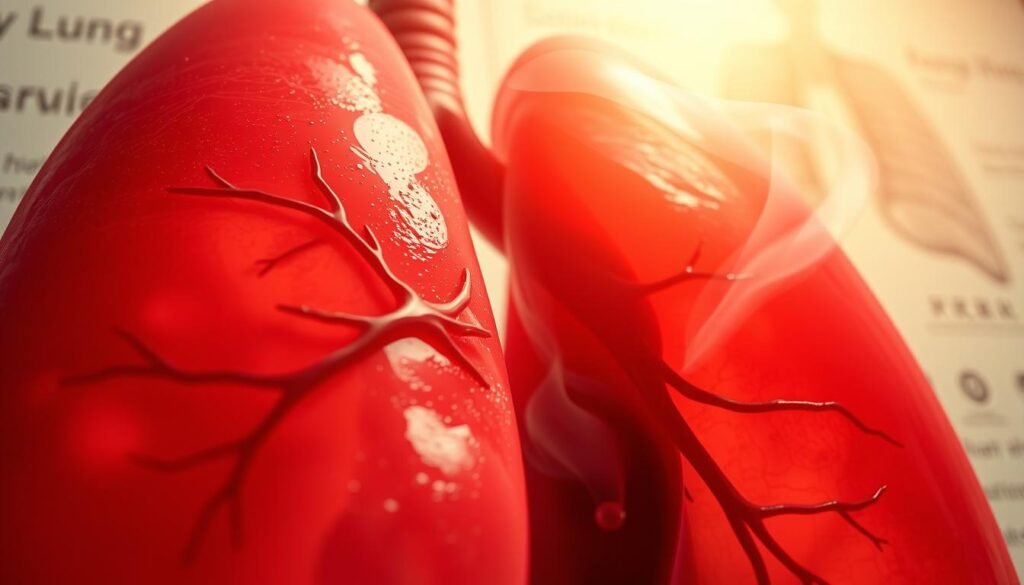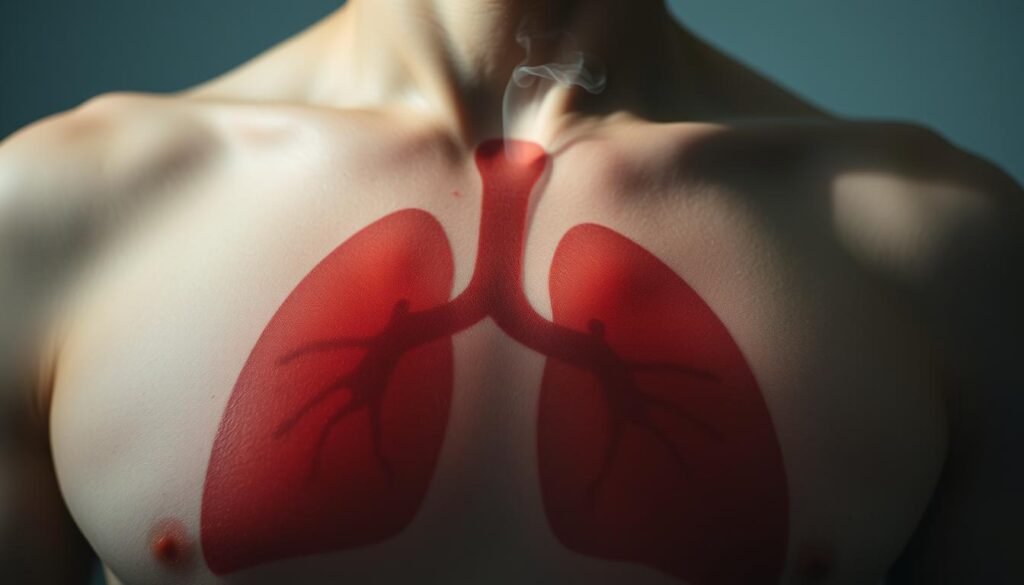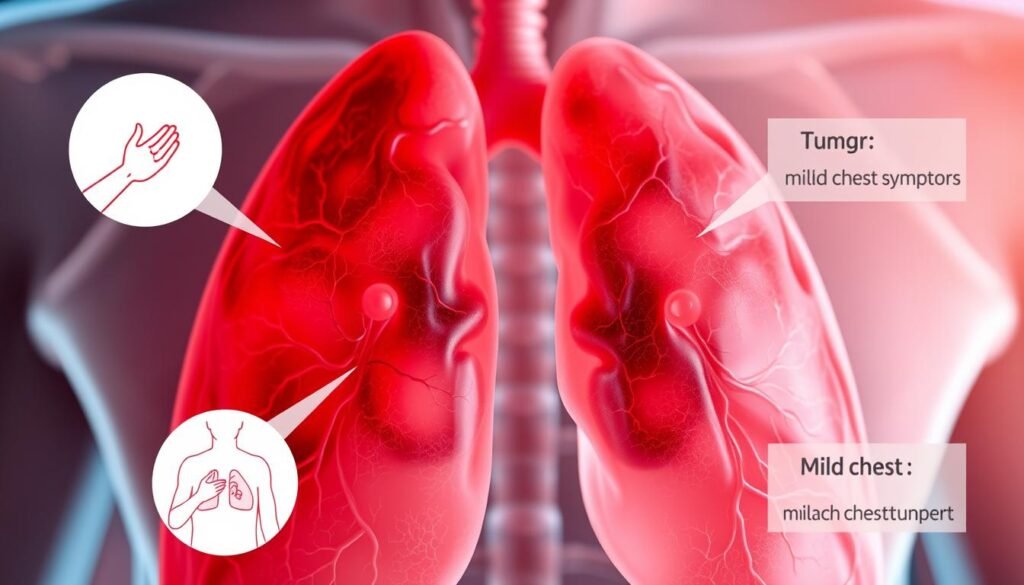Surprisingly, about 6.3% of adults in the United States will face lung cancer. A lot of times, lung cancer doesn’t show signs until it’s more advanced. This makes, spotting lung cancer symptoms in stage 1 crucial for a better outcome. Some early signs include a cough that won’t quit, losing weight without trying, and feeling short of breath. Knowing these symptoms and getting help fast can boost the chances of successful treatment.
Key Takeaways
- Approximately 6.3% of adults in the U.S. will receive a lung cancer diagnosis.
- Early lung cancer signs can lead to improved treatment outcomes.
- Common symptoms include a cough that doesn’t go away and unexplained weight loss.
- Many lung cancer cases do not show symptoms until later stages.
- Prompt recognition of symptoms can impact prognosis positively.
- Regular screenings are recommended for high-risk individuals, such as long-term smokers.
Understanding Lung Cancer
Lung cancer is a serious health issue, split into two main kinds: NSCLC and SCLC. NSCLC is the most common, making up about 84% of cases. SCLC, on the other hand, accounts for roughly 15%.
Smoking is a big risk factor for lung cancer. Secondhand smoke and pollution also play a role. Knowing how these affect our health helps us prevent the disease.
The stats on lung cancer show survival rates depend on when it’s found. For example, stage 1 lung cancer has tumors up to 4 cm. They haven’t spread. In this stage, the chance of living five years after diagnosis is about 63%.
For stage 1 lung cancer, surgery might be the first treatment step. The type of cancer, tumor size, and the patient’s health matter in choosing treatment. Knowing the cancer type and stage helps doctors improve care.
| Type of Lung Cancer | Prevalence | Common Treatment Options |
|---|---|---|
| Non-Small Cell Lung Cancer (NSCLC) | 84% | Surgery, Chemotherapy, Radiation |
| Small Cell Lung Cancer (SCLC) | 15% | Chemotherapy, Radiation |
Early Lung Cancer Signs
Learning about the first signs of lung cancer can make a big difference. Early signs often look like normal breathing problems. This confusion can slow down getting the right help. Look out for a persistent cough, chest pain, and unexplained weight loss. These are key signs, especially for smokers or those around a lot of pollution.
If you keep coughing and it gets worse, pay attention. It could be an early warning. Chest pain that sticks around and messes with your day is another sign. Suddenly losing weight without trying is also a red flag. These symptoms should make you want to see a doctor.
Knowing these signs can save lives. Catching lung cancer early leads to better chances of beating it. For more info on catching signs early, visit Care Your Lungs. Quick action could mean a better outcome.

Lung Cancer Symptoms Stage 1
Knowing the symptoms of stage 1 lung cancer is key for effective treatment. At this early stage, people might notice certain signs. It’s very important not to ignore these early hints of lung cancer. Quick medical help can make a huge difference in the outcome.
Common Symptoms to Recognize
Stage 1 lung cancer shows signs that are often missed but crucial. These common symptoms are:
- A persistent cough that does not resolve over time.
- Coughing up blood or rust-colored sputum.
- Unexplained shortness of breath, even during light activities.
Being aware of these signs is crucial for catching the disease early. This early detection can lead to better treatment options and chances of recovery.
Importance of Early Detection
Spotting lung cancer early is critical for improving survival rates. People found to have lung cancer at this stage have a much better outlook. Realizing these early signs and getting checked makes treatment more impactful. If you notice these symptoms, seeing a doctor right away is key. Early diagnosis allows doctors to create a specific treatment plan.

Initial Lung Tumor Indicators
It’s important to catch lung cancer early. Many people overlook early signs, thinking they’re just common illnesses like bronchitis. Knowing what to watch for can help find the disease early. This can change your outcome for the better.
Some early signs of lung cancer include:
- Persistent cough: Worry if a cough stays for weeks without getting better.
- Unexplained weight loss: Losing weight without trying could be a sign of stage 1 lung cancer.
- Recurring respiratory infections: Getting bronchitis or pneumonia often should be a red flag.
Lung cancer is behind 25% of all cancer deaths in the US, making awareness key. While smoking is the top cause for over 90% of these cancers, even non-smokers need to stay alert. Changes in health should never be ignored.
Knowing the early signs of lung cancer can save lives. Talking to doctors about any strange symptoms is critical. This is especially true for those at higher risk. Early action can slow down the disease or even stop it.

Beginning Lung Cancer Symptoms
Early recognition of lung cancer signs is key for timely treatment. Many might not notice the disease’s initial symptoms. Knowing the early signs is crucial, especially for lung adenocarcinoma symptoms stage 1.
Cough That Does Not Go Away
A lasting cough is a major early sign of lung cancer. It’s important if the cough gets worse or has blood. If a cough lasts more than eight weeks, see a doctor right away.
Unexplained Weight Loss
Sudden weight loss could mean health problems, like lung cancer. If you’re losing weight without trying, take it seriously. This sign is often linked with lung adenocarcinoma symptoms stage 1.
Shortness of Breath
Feeling short of breath is a common sign of early lung cancer. The disease may make air passages narrow, causing breathing problems. Seek help immediately if you have this symptom, along with others.
| Symptom | Description |
|---|---|
| Persistent Cough | A cough lasting longer than eight weeks; may worsen or include blood. |
| Unexplained Weight Loss | Sudden weight loss without dietary or lifestyle changes. |
| Shortness of Breath | Difficulty breathing; may worsen with activity or rest. |
Lung Adenocarcinoma Symptoms Stage 1
Lung adenocarcinoma is a common type of lung cancer. The lung adenocarcinoma symptoms stage 1 may be hard to notice. At this stage, clear signs are often absent. Still, knowing these symptoms is vital for timely treatment.
Some signs include a persistent cough that doesn’t go away. You might feel short of breath, especially when active. There could be chest pain, often confused with other problems, and fatigue that impacts daily life.
- A persistent cough that does not improve over time.
- Shortness of breath, which can become increasingly apparent during physical activity.
- Chest discomfort or pain that might be mistaken for other issues.
- Fatigue, which can affect daily activities and overall quality of life.
For diagnosing stage 1 lung adenocarcinoma, routine scans and screenings are key. These are especially helpful for those at higher risk, like smokers or people with a family history of lung cancer.
Early treatment can make a big difference. Surgery, such as a lobectomy, might be recommended. After that, chemotherapy or targeted treatments might follow. The survival rate is about 64% for those with localized cancer, showing the importance of monitoring your health.
Finding lung adenocarcinoma symptoms stage 1 early is crucial. For more info, check out resources on lung cancer early detection signs. Taking early steps is key to maintaining lung health.
Lung Squamous Cell Carcinoma Stage 1 Symptoms
Lung squamous cell carcinoma is a key type of lung cancer, making up about 30% of cases. It’s important to know the early signs for timely treatment. Some stage 1 symptoms are:
- Coughing: A cough that stays over time might mean something serious.
- Chest Pain: Feeling discomfort or pain in the chest needs checking.
- Fatigue: Feeling unusually tired all the time affects your day.
- Hoarseness: A change in voice or constant hoarseness deserves attention.
Knowing these stage 1 symptoms of lung squamous cell carcinoma can help spot early signs. Regular check-ups and talking to doctors can improve the chances of beating it. This is key because three out of four cases are found too late.
Spotting lung cancer early is crucial. Being informed about these signs helps you get help sooner. This could mean better chances of beating the disease with treatments like surgery. Staying aware of these symptoms is an important step in looking after your health.
Chronic Symptoms and Recurring Infections
People with lung cancer often face chronic symptoms that affect their lives. These symptoms include ongoing coughs, feeling very tired for no reason, and trouble breathing. While other respiratory issues might cause these, they could also suggest something more serious.
Another big worry is lung cancer coming back through infections. Not getting better from respiratory infections like bronchitis or pneumonia could hint at lung cancer. Nearly 59% of folks with early-stage lung cancer didn’t have symptoms when found. This shows how important it is to watch out for consistent health problems.
Sometimes, coughing up blood is the first clue of lung cancer for many people. This, along with wheezing or feeling short of breath, makes lung cancer more likely.
Finding lung cancer early can save lives. It’s crucial to talk to doctors about anything new or odd about your health. Spotting and sharing these chronic signs early can lead to tests. This might help find the cancer sooner and improve treatment success.
| Chronic Symptoms | Associated Infections | Key Considerations |
|---|---|---|
| Persistent Cough | Bronchitis | May indicate lung cancer if chronic |
| Fatigue | Pneumonia | Monitor for recurrent infections |
| Hemoptysis (Coughing up blood) | Other Respiratory Issues | Significant predictor of lung cancer |
| Wheezing | N/A | Presence of obstruction may indicate tumor |
| Shortness of Breath | N/A | Common in more advanced stages |
Conclusion
Knowing about early lung cancer symptoms is key for quick action and better treatment outcomes. Early signs include a constant cough, losing weight without trying, and feeling short of breath. These signs can greatly improve the chances of survival.
Being aware and seeking help early if you’re at risk is crucial. This is especially true for smokers or those around harmful substances. Catching lung cancer early, especially the non-small cell type, can lead to a 65% survival rate if found when still local. Lung cancer is the top reason for cancer deaths in the U.S., making awareness critical.
Spreading knowledge and pushing for early checks when symptoms appear can save lives. Knowing about stage 1 lung cancer symptoms starts you on the path to keeping your lungs healthy. It’s the first step to living a longer, healthier life.